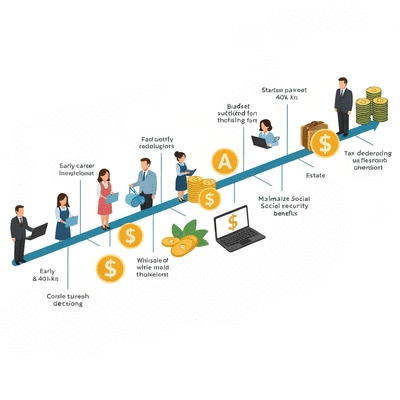Retirement Planning Mistakes to Avoid
By Oliver Grant / Nov 03
Retirement planning isn't just a task for those nearing the end of their careers; it's a lifelong commitment that shapes your financial future. Starting early and adjusting your plans as life changes can make a significant difference in achieving your retirement goals. Here’s what you will learn:
Understanding how planning strategies adjust based on your career stage can maximize your savings and help secure a comfortable retirement. For more detailed insights on building a resilient financial future, consider building a diversified investment portfolio.
Have you ever thought about retirement and wondered when the right time to start planning is? The truth is, retirement planning is crucial at every stage of life. Whether you’re just starting your career or nearing retirement age, having a clear plan can significantly impact your financial future. At Financial Adviser Digest, we believe that understanding the importance of retirement planning is the first step toward achieving your financial goals!
As financial advisers, we often encounter individuals who underestimate the benefits of early retirement planning. Starting sooner rather than later allows you to take advantage of compound interest, which can lead to substantial savings over time. By recognizing the importance of planning at various life stages, you can lay the groundwork for a secure and fulfilling retirement. This is also a good time to consider understanding Australian retirement income streams.
It's never too early—or too late—to start thinking about your retirement! Each life stage presents unique opportunities and challenges, making it vital to tailor your approach accordingly. Here are a few reasons why retirement planning is essential at every age:
By acknowledging the relevance of retirement planning at every age, you can create a comprehensive strategy that evolves with you. This adaptability is key to ensuring your retirement dreams become a reality!
Establishing your retirement goals is not a one-time task; it’s a lifelong journey! From the moment you start working, it’s essential to consider what you want your retirement to look like. Ask yourself questions like: What hobbies do you want to pursue? Where would you like to live? Understanding your retirement vision can significantly impact your financial planning.
Here are some steps to help you identify your retirement goals:
By continuously refining and adapting your retirement goals, you’ll position yourself for lasting success. Remember, this journey is about creating the life you envision, and Financial Adviser Digest is here to support you every step of the way!
Now that we've established the importance of retirement planning and goal-setting, let’s delve into some strategic approaches tailored to different age groups. By understanding how to adjust your planning strategy based on your career stage, you can maximize your savings and secure a comfortable retirement.
Did you know? Engaging in retirement planning early can significantly enhance your financial security. Start by setting small, achievable savings goals each month. Even contributing a modest amount can lead to substantial growth over time, thanks to the power of compound interest. Remember, every little bit counts!
When it comes to retirement planning, one of the most important strategies is adaptability. Life is full of surprises, and being flexible with your retirement plans can help you navigate unexpected changes. Whether it's a new job opportunity, a shift in family dynamics, or changes in health, your retirement strategy should evolve with you.
Remember, the goal is not just to save money, but to create a financial roadmap that aligns with your life’s priorities and aspirations. Here are a few key takeaways to keep in mind:
By prioritizing adaptability, you can maintain a dynamic retirement plan that supports your long-term well-being.
Life is unpredictable, and your retirement plans should reflect that reality. As we move through various life stages, it’s essential to assess our goals and adjust our strategies accordingly. Think about major milestones—like marriage, purchasing a home, or having children—that can affect your financial priorities.
Make it a habit to revisit your retirement plan at least once a year. Consider the following factors during these reviews:
Regular adjustments not only keep your retirement strategy relevant but also give you the peace of mind that you’re on track to achieve your dreams.
It’s one thing to talk about retirement planning, but taking action is where the real progress happens. One of my favorite ways to simplify this process is through the use of checklists and calculators. These tools can provide structure and keep you focused on your goals.
Here are some practical steps to enhance your retirement planning process:
Engagement is key to successful retirement planning! I always encourage advisers and clients alike to start thinking about retirement as early as possible. Even small contributions can add up over time thanks to the power of compounding.
Here are some ways to foster early and ongoing engagement with your retirement goals:
Don’t underestimate the impact of early engagement—it's the foundation for a secure and fulfilling retirement.
Lastly, as you build your retirement plan, it’s vital to also consider legacy and estate planning. This aspect can feel daunting, but it’s an essential part of ensuring your wishes are honored and your loved ones are taken care of. For instance, understanding 2025 Australian tax planning insights can be crucial to effective wealth transfer.
Consider the following elements in your legacy planning:
With a thoughtful approach to legacy planning, you can leave a lasting impact that reflects your values and care for those you love.
Here is a quick recap of the important points discussed in the article:



 Retirement Planning Mistakes to Avoid
Every financial journey is unique, but the path to a secure retirement often involves navigating com
Retirement Planning Mistakes to Avoid
Every financial journey is unique, but the path to a secure retirement often involves navigating com
 Understanding Australian Government Support for Retirees
Understanding the intricacies of retirement can feel daunting, especially with so many options avail
Understanding Australian Government Support for Retirees
Understanding the intricacies of retirement can feel daunting, especially with so many options avail
 Capital Gains Tax Strategies in 2025
As we approach 2025, the importance of understanding Capital Gains Tax (CGT) in Australia cannot be
Capital Gains Tax Strategies in 2025
As we approach 2025, the importance of understanding Capital Gains Tax (CGT) in Australia cannot be